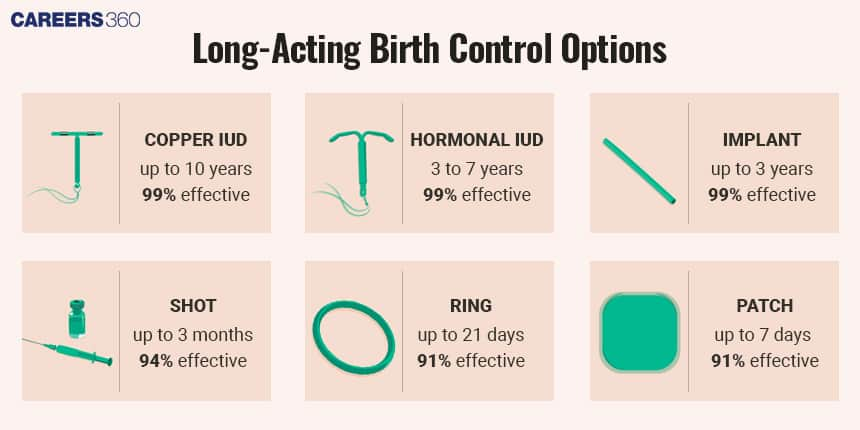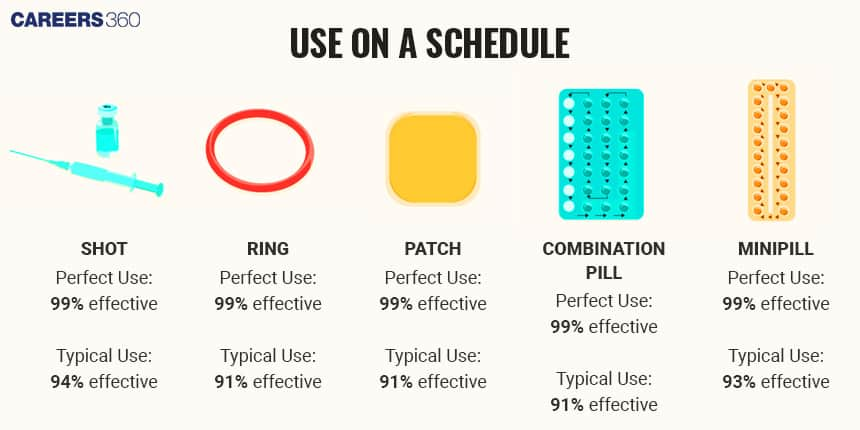Birth Control: Forms, Options, Risks & Effectiveness, Information, Types
Birth control refers to pregnancy prevention so that individuals can have children at their plan and suitable spacing. There are several techniques like hormonal methods, barrier methods, intrauterine devices (IUDs) and natural methods. Knowing these can guide a well-informed choice in reproductive health. This topic is covered in the Class 12 chapter Reproductive Health in Biology. Questions regarding contraceptive methods, their efficiency, and health impacts are often asked in competitive examinations like NEET, AIIMS, Nursing, and Paramedical.
NEET 2025: Mock Test Series | Syllabus | High Scoring Topics | PYQs
NEET Important PYQ's Subject wise: Physics | Chemistry | Biology
New: Meet Careers360 B.Tech/NEET Experts in your City | Book your Seat now
- What is Birth Control?
- Types of Birth Control Methods
- Effectiveness of Contraceptive Methods
- Factors to Consider when Choosing Birth Control
- Tips, Tricks and Strategies to Study Birth Control for Different Exams
- Weightage and Types of Questions on Birth Control Asked in Different Exams
- Recommended Video on Birth Control

What is Birth Control?
Birth control is a commonly known term that stands for contraception. It refers to different ways and tools for preventing pregnancy, giving a person, or a couple an opportunity and freedom to plan a family and control their fertility according to their will to do so. There are many methods of contraception, which will be elaborated in the following points, therefore, making regard towards safe sex an informed choice.
Read More:
Types of Birth Control Methods
The details are given below:
Barrier Methods
Barrier methods prevent the sperm from reaching the egg. Some of the commonly used barrier methods are:
Condoms: Condoms are available for men and women; condoms are efficient in preventing pregnancies and also protect from sexually transmitted infections.
Diaphragms: Diaphragm is a dome-shaped cup used in the vagina before intercourse, but it should be used with spermicide for better performance.
Hormonal methods of contraception: It changes the balance of the body's hormones to prevent ovulation.
Birth Control Pills: Taken orally daily, the tablets inhibit ovulation, and birth control pills can also help a female to regulate their menstrual cycle and eliminate painful menstruation cramps.
Patches: Adhesive patches, impregnated with hormones, are applied trans-dermally, while they adhere or stick on the skin, hormones are absorbed across the skin into the bloodstream, consequently hindering ovulation.
Injections: The hormonal shot is injected every three months, and it serves to prevent ovulation.

IUDs
IUDs are devices that are inserted into the uterus. It can either be hormonal or copper-based and provides contraception for a long period, normally between 3 and 10 years.
Natural methods
This involves tracking the cycle of fertility in women. This comprises:
Natural Birth Control Methods: These include abstinence and the rhythm method, where intercourse is avoided during a woman's fertile period.
Fertile Period: A woman is fertile for 9 days each month, starting 5 days before ovulation and lasting 3 days after.
Permanent methods
Permanent methods are surgeries for someone who doesn't plan to have children in the future:
Tubal Ligation: This is a surgical method for a female that blocks their fallopian tubes so they cannot get pregnant.
Vasectomy: This is a specific surgical method for a male, cutting the vas deferens so that sperm cannot mix with semen.
Effectiveness of Contraceptive Methods
The details are given below:
Effectiveness Rates
The effectiveness of contraceptive methods sharply varies:
IUDs and Implants: More than 99% effective.
Hormonal Methods: 91-99% effective, depending on proper use.
Barrier Methods: 82-98% effective, depending on correct usage.

Factors to Consider when Choosing Birth Control
The details are given below:
Personal Health
A person should be able to consult their health professional to outline for them any preconditions they have that need to be considered when choosing the appropriate birth control method.
Lifestyle Considerations
Consider your lifestyle, the frequency at which you have sex, and which method you are most comfortable with while choosing a birth control method
Possible Side Effects
Consider the possible side effects associated with each method including hormonal fluctuations, mood swings, or allergy to the method.
Tips, Tricks and Strategies to Study Birth Control for Different Exams
Here are some tricks to study Birth Control:
Methods of Birth Control
Mnemonic: "HANDS ON BIRTH CONTROL"
Hormonal methods (e.g., pills, patches)
Abstinence (total or periodic)
Natural methods (e.g., rhythm method)
Diaphragm (barrier method)
Spermicides
Oral contraceptives
Non-hormonal IUDs
Barrier methods (e.g., condoms)
IUDs (Intrauterine devices)
Restriction of sexual activity
Tubal ligation (female sterilization)
Hysterectomy (surgical removal of the uterus)
Condoms (male and female)
Outside the fertile period
Neutralization of sperm
Transitional methods (e.g., withdrawal)
Reproductive health awareness
Other surgical methods (e.g., vasectomy)
STDs and Their Symptoms
Mnemonic: "HIV C HITS"
Human Immunodeficiency Virus (HIV)
Infection (Bacterial STDs)
Viral STDs (e.g., herpes, hepatitis)
Chlamydia (burning sensation, discharge)
Herpes (blisters, sores)
Inflammation (pelvic inflammatory disease)
Triple symptoms (painful urination, discharge, bleeding)
Syphilis (rash, sores)
Female Reproductive System Parts
Mnemonic: "Ovaries Offer A Great Cervix"
- Ovaries
- Oviducts (Fallopian tubes)
- Abdominal cavity (where fertilization occurs)
- Gravid uterus (during pregnancy)
- Cervix (lower part of the uterus)
Weightage and Types of Questions on Birth Control Asked in Different Exams
The table below indicates the weightage and types of questions asked from birth control in different exams:
| Exam Type | Weightage of Birth Control | Types of Questions |
|---|---|---|
| CBSE | 5-7% | Short answers on types of birth control methods, effectiveness, and implications for health |
| 4-6% | MCQs on hormonal and barrier methods, contraceptive mechanisms, and reproductive health | |
| Nursing Entrance Exams | 3-5% | True/False questions on birth control methods, their effectiveness, and related health issues |
| Paramedical Exams | 2-4% | Case studies on family planning, reproductive choices, and their impacts on health |
| AIIMS | 3-5% | Assertion-reason questions on contraceptive methods and their role in reproductive health |
Also Read:
| Amniocentesis | Contraception |
| Intrauterine Insemination | Sexually Transmitted Disease |
| Disorders of the Human Reproductive System | Human Reproductive System |
Recommended Video on Birth Control
Frequently Asked Questions (FAQs)
The IUD and implant are the most user-friendly and reliable forms of birth control, and they also work the best at preventing conception. If used properly, other birth control methods, such as the pill, ring, patch, and injection, are also quite effective at preventing pregnancy.
The most frequent adverse effects are headaches, nausea, aching breasts, and spotting or bleeding between periods (this is more frequent with progestin-only pills). However, symptoms often disappear within two to three months and don't affect everyone who takes the medication. You shouldn't feel ill or unpleasant while using birth control.
There are many different methods and gadgets for birth control that can stop conception. These techniques can be used on both men and women. Only a few of the numerous approaches are trustworthy. The method's efficacy is based on how meticulously it is applied.
Natural birth control is a way to avoid getting pregnant without using drugs or other artificial means. Based on knowledge and observations of a woman's body and menstrual cycle, several ideas have been developed.
Injections for birth control are increasingly accessible as well. IUDs, also known as intrauterine devices, are little T-shaped objects inserted into the uterus. There are two different IUD kinds. Small amounts of copper are released by copper IUDs into the uterus, stopping sperm from reaching the ovary.
They hinder the process of ovulation, thicken the mucus in the cervix, and thin the lining of the uterus from building up so as not to avoid pregnancy.
Yes, depending on the type one is taking, one can experience nausea, headache, and mood swings, among other effects.
Also Read
10 Nov'24 07:38 PM
21 Oct'24 09:47 AM
11 Oct'24 03:48 PM
04 Oct'24 05:02 PM
18 Sep'24 03:06 PM
29 Aug'24 05:24 PM
29 Aug'24 09:04 AM
29 Aug'24 08:57 AM
29 Aug'24 08:46 AM